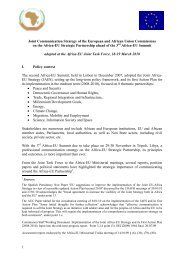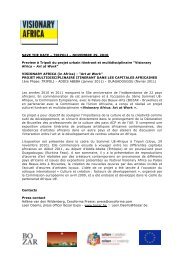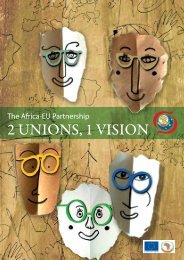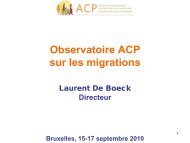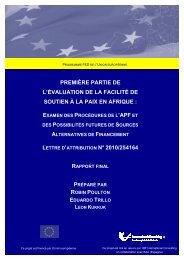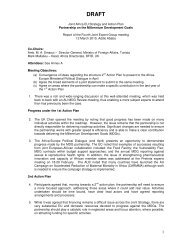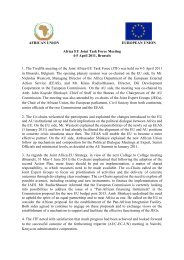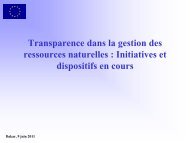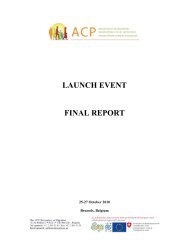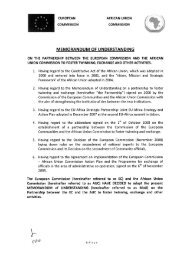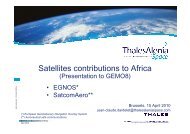part 1 of the african peace facility evaluation - European ...
part 1 of the african peace facility evaluation - European ...
part 1 of the african peace facility evaluation - European ...
You also want an ePaper? Increase the reach of your titles
YUMPU automatically turns print PDFs into web optimized ePapers that Google loves.
mechanism, EDF has its own decision-making procedures, which exclude intervention <strong>of</strong> <strong>the</strong><br />
<strong>European</strong> Parliament and ensures that EU member states have more direct influence over <strong>the</strong> use <strong>of</strong><br />
resources than with <strong>the</strong> regular EU budget.<br />
The current APF legal framework will be in force until 2013 when <strong>the</strong> 10 th EDF ends - although<br />
Cotonou continues until 2020. The EDF might be integrated into <strong>the</strong> EU budget. APF might be left out<br />
<strong>of</strong> this framework and a decision will be taken on whe<strong>the</strong>r <strong>the</strong> APF can be managed through <strong>the</strong><br />
Commission and/or through <strong>the</strong> <strong>European</strong> External Action Service. The changed legal framework <strong>of</strong><br />
<strong>the</strong> Lisbon Treaty means that new procedures and internal EU task division is required if <strong>the</strong> EDF is<br />
budgeted. Therefore, it is important to observe what procedural characteristics from o<strong>the</strong>r EU financial<br />
instruments might be incorporated into <strong>the</strong> APF legal framework. New procedures should naturally<br />
improve and shorten <strong>the</strong> current APF decision-making procedures. Moreover, if more relevant<br />
procedures are available within o<strong>the</strong>r EU instruments, <strong>the</strong> latter could also be applied to <strong>the</strong> future<br />
APF even if <strong>the</strong> EDF is not budgeted.<br />
INSTRUMENT FOR STABILITY<br />
IfS can provide inter alia technical and financial assistance to support efforts by international and<br />
regional organisations to promote confidence building, mediation, dialogue and reconciliation in<br />
response to situations <strong>of</strong> crisis or emerging crisis. In stable conditions for cooperation, IfS can also<br />
provide technical and financial assistance, pre- and post-conflict long-term capacity building support<br />
for international and regional organisations, to help promoting early warning and mediation. These<br />
latter measures may include know-how transfer, exchange <strong>of</strong> information, risk/threat assessment,<br />
research and analysis, early warning systems and training. In this sense, we could say that IfS might<br />
fund certain activities now being funded by APF under ERM. However, IfS cannot finance military<br />
operations, even if <strong>the</strong>y have a <strong>peace</strong>keeping purpose, as this would contradict EU Treaties on <strong>the</strong><br />
competence <strong>of</strong> <strong>the</strong> Commission.<br />
IfS intervenes with ‘exceptional assistance measures’ and ‘interim response programmes’ adopted<br />
following <strong>the</strong> general EC decision-making procedures (inter-service consultation, College <strong>of</strong><br />
Commissioners). However, contrary to what is required for APF, <strong>the</strong> Commission does not ‘request’<br />
<strong>the</strong> approval <strong>of</strong> <strong>the</strong> PSC, it simply informs <strong>the</strong> PSC <strong>of</strong> <strong>the</strong> measures <strong>the</strong>y are planning to take, and<br />
have 48 hours to object. Never<strong>the</strong>less, <strong>the</strong> Commission meets with <strong>the</strong> PSC once a month to discuss<br />
<strong>the</strong> measures <strong>the</strong>y are planning. Two days before <strong>the</strong> meeting <strong>the</strong>y send PSC a note (‘IfS monthly<br />
note’) outlining <strong>the</strong> content <strong>of</strong> <strong>the</strong>se measures (a very broad outline, roughly 3 or 4 paragraphs per<br />
measure). This note is discussed during <strong>the</strong> PSC meeting. If <strong>the</strong> measure costs more than €20m, a<br />
special Council committee must be consulted, made up <strong>of</strong> EU MS representatives. 46 A negative<br />
opinion obliges <strong>the</strong> Commission to delay adoption for up to three months. IfS managers say <strong>the</strong>y have<br />
reduced <strong>the</strong> burden <strong>of</strong> ‘comitology’ from 12 months to two months in <strong>the</strong> best conditions, although <strong>the</strong>y<br />
can send mediation missions in a matter <strong>of</strong> days using a pre-approved Standing Facility (<strong>the</strong> Georgia<br />
Observer Mission was on <strong>the</strong> ground within 3 weeks). An average <strong>of</strong> 2 months is necessary, more or<br />
less <strong>the</strong> same as for <strong>the</strong> quickest APF decisions.<br />
IfS only intervene when o<strong>the</strong>r instruments are not available. The EC <strong>of</strong>ficers in charge have to<br />
constantly assess <strong>the</strong> international situation and carry out programme identification in cooperation with<br />
EU delegations.<br />
In <strong>the</strong>ory, even if Member states disagreed with IfS measures, <strong>the</strong> Commission could still go ahead<br />
with <strong>the</strong>m. In practice, if a proposal raises concerns amongst MS, <strong>the</strong> Commission takes a second<br />
look. This only happened once, out <strong>of</strong> a total <strong>of</strong> some 140 measures proposed to date, because a lot<br />
<strong>of</strong> political coordination takes place upstream, both with PSC Delegations and with MS embassies in<br />
<strong>the</strong> country concerned. IfS is normally pretty sure when proposing a <strong>part</strong>icular measure, that it will not<br />
raise difficulties in <strong>the</strong> PSC.<br />
46 EU Member States representatives have 48 hours to oppose.<br />
Page 33 <strong>of</strong> 49




